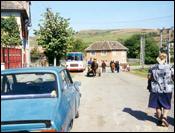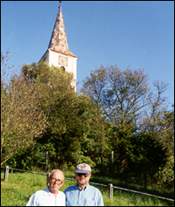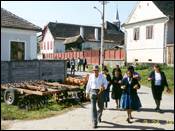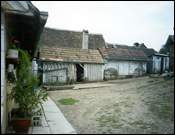|
|
Village
Street
On the streets in Vurpar (Burgberg in German) you will see
horse carts, children, geese, ducks, cattle, horses, oxen,
dogs, cats, and cars from the city. It is a very lively place
where some 2,400 people live, work and study. There is, however,
no industry in Vurpar. Its is strictly an agricultural community. |
|
|
Car,
Bus, Wagon
Side by side with a modern Euro Bus a horse cart that evokes
the middle ages. The vehicle is a reminder of traditions and
a measure of wealth, a highly useful and durable tool in village
life. While cars are readily available they are terribly expensive
for the average villager and do not endure the rough local
roads well. |
|
|
The
Saxon church
Saxons (Sasi in Romanian) came to Vurpar(Burgberg in German)
in the 13th century from Germany. They were invited to settle
the area by the local princes. Advanced Saxon skills in agriculture,
industry, crafts and organization were expected in bring wealth
to the prince who offered the settlers free land in exchange
for feudal rents. Correspondingly, Christian princes in the
west happily sent the Saxons east to establish human buffer
zones against invading Tatar and Turk. In Vurpar they built
farms and a beautiful church overlooking the village from
a hill on the north end of town. |
|
|
Going
Home
Most people walk from home to their various destinations,
whether church, the clinic,
townhall or the pastures. Here a
group of villagers head home. |
|
|
Yard
Gate
The gate to the courtyard is very sturdy. It is made of iron
and decoratively painted, but its purposed is to keep out
the unwelcome guest. |
|
|
Family
Yard
To the left is the summer kitchen building with attic lager.
Ahead is a wood working area, and to its right a pig sty,
a chicken coup and an outhouse in the corner. Many houses
have indoor plumbing, but many still augment flush toilets
with more traditional systems. To the right of the outhouse
is a gate leading to vegetable gardens. |
|
|
Yard
& Barn
The courtyard is the scene of work and celebration. |
Next
Page
|








